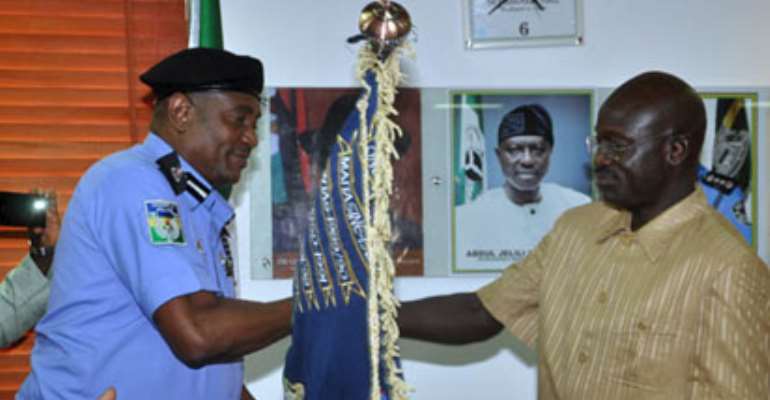Abba's unceremonious exit – The Nation

For the immediate past Inspector-General of Police (IGP), Mr. Suleiman Abba, the concept 'lame duck' would continue to resonate for a long time to come. President Goodluck Jonathan proved to the IGP that it is not over until it is over by relieving him of his appointment on April 21, barely five weeks to the end of the Jonathan presidency on May 29. The statement announcing Abba's retirement after more than 30 years in the police force was signed by Dr Reuben Abati, the president's special adviser on media and publicity.
It is unfortunate that Mr Abba's service in the police force came to such an unceremonious end about four years to his retirement on March 22, 2019 . But his abrupt exit from the police force should serve as admonition to his successor/s that the noblest way to serve the country is by being diligent and professional in their assignments. Mr Abba sure deserves what he got if only for the involvement of the police under him in partisan politics. Indeed, many people had expected he should be preparing to exit with President Jonathan as a result of this.
At least three examples of his partisan policing will do. First, the Osun State governorship election of last year, in which the police and some other security forces illegally arrested about 700 members of the All Progressives Congress (APC), including some electoral officers suspected to be sympathetic to the party's cause, as a way to intimidate them and take them out of circulation for the duration of the polls. Then the activities of the controversial Mr. Joseph Mbu, the Assistant Inspector-General of Police then in charge of Zone 7, who banned the #bringbackourgirls campaigners' rallies. Mr Abba's sin here was his inability to call Mr Mbu to order.
Again, the role of Mr Abba himself in the persecution of the Speaker of the House of Representatives, Aminu Tambuwal, following his defection from the ruling Peoples Democratic Party (PDP) to the APC, last year. Abba said by the defection the speaker had lost his membership of the House since he was elected on the platform of the PDP. He withdrew Tambuwal's security detail which was only restored after it became obvious that the APC looked set to win the presidential election.
Having made himself available for biased causes for President Jonathan and the PDP so far, the president and his party would have expected that Mr Abba would not depart from that path till the end. But what did we have? As soon as it was becoming clear that Gen. Buhari was likely to win the presidential election, Mr Abba's police force became 'born again' and began to relax his anti-APC posture, a thing he should have done ab initio as a professional police boss. Although no reasons were given for Mr Abba's sack, many people had speculated that it could not have been unconnected with this newfound favour towards the opposition.
Mr. Abba, 56, had served the police in several capacities. He was an Assistant Inspector-General of Police in charge of Zone 7 since May 25, 2012, before he was promoted Acting IGP on August 1, 2014 . He also served as aide de camp (ADC) to Mrs Maryam Abacha, wife of former military Head of State, General Sani Abacha. He was confirmed substantive IGP on November 4, 2014 .
All said however, whatever sections of our laws that allow the president to single-handedly sack people in certain positions, including the IGP, have to be revisited. Otherwise, we would continue to have a vicious cycle of premature retirements because even if President Jonathan had not sacked Mr Abba, the incoming government is not likely to retain him because of the unprofessional manner he did his job.
Moreover, such officers over whom the president had the power of life and death would continue to see themselves as personal employees of the president. And, as they say, 'he who pays the piper dictates the tune'. Those laws are not in the country's interest; they must be reviewed to make others, like the National Assembly, have input into such crucial decisions.
